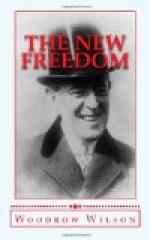We used to think in the old-fashioned days when life was very simple that all that government had to do was to put on a policeman’s uniform, and say, “Now don’t anybody hurt anybody else.” We used to say that the ideal of government was for every man to be left alone and not interfered with, except when he interfered with somebody else; and that the best government was the government that did as little governing as possible. That was the idea that obtained in Jefferson’s time. But we are coming now to realize that life is so complicated that we are not dealing with the old conditions, and that the law has to step in and create new conditions under which we may live, the conditions which will make it tolerable for us to live.
Let me illustrate what I mean: It used to be true in our cities that every family occupied a separate house of its own, that every family had its own little premises, that every family was separated in its life from every other family. That is no longer the case in our great cities. Families live in tenements, they live in flats, they live on floors; they are piled layer upon layer in the great tenement houses of our crowded districts, and not only are they piled layer upon layer, but they are associated room by room, so that there is in every room, sometimes, in our congested districts, a separate family. In some foreign countries they have made much more progress than we in handling these things. In the city of Glasgow, for example (Glasgow is one of the model cities of the world), they have made up their minds that the entries and the hallways of great tenements are public streets. Therefore, the policeman goes up the stairway, and patrols the corridors; the lighting department of the city sees to it that the halls are abundantly lighted. The city does not deceive itself into supposing that that great building is a unit from which the police are to keep out and the civic authority to be excluded, but it says: “These are public highways, and light is needed in them, and control by the authority of the city.”
I liken that to our great modern industrial enterprises. A corporation is very like a large tenement house; it isn’t the premises of a single commercial family; it is just as much a public affair as a tenement house is a network of public highways.
When you offer the securities of a great corporation to anybody who wishes to purchase them, you must open that corporation to the inspection of everybody who wants to purchase. There must, to follow out the figure of the tenement house, be lights along the corridors, there must be police patrolling the openings, there must be inspection wherever it is known that men may be deceived with regard to the contents of the premises. If we believe that fraud lies in wait for us, we must have the means of determining whether our suspicions are well founded or not. Similarly, the treatment of labor by the great corporations is not what it was in Jefferson’s time.




